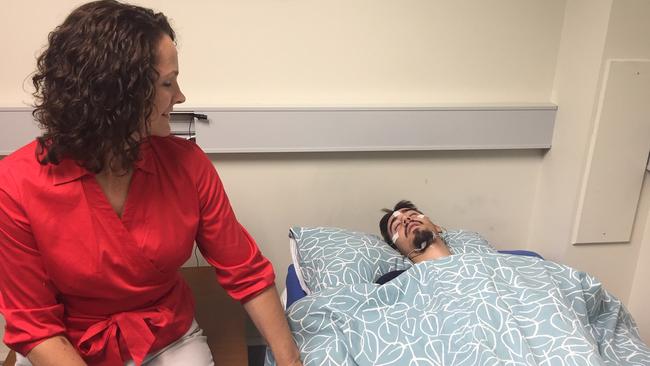How much sleep does your teen really need? Adelaide research may have the answer
Teenagers who don’t get enough shut-eye at night are at risk of much more than being distracted in class — in fact, new Adelaide research reveals an alarming escalation in risk-taking behaviour among sleep-deprived teens. So how much sleep do teens need?
SA News
Don't miss out on the headlines from SA News. Followed categories will be added to My News.
- Why sex is good for sleep: Adelaide sleep researcher Dr Michele Lastella
- Sleep services moving to Queen Elizabeth Hospital from the RAH
Teenagers who don’t get enough shut-eye at night are at risk of much more than being a bit distracted in class with new Adelaide research revealing an alarming escalation in risk-taking behaviour among sleep-deprived teens — at a rate of 43 per cent.
Flinders University research fellow Michelle Short said the findings, which considered the behaviours of 570,000 teenagers world-wide, came as a shock and parents have a role to play in ensuring their kids get the sleep they need.
Dr Short says sleep lab tests have previously shown a link between sleep deprivation and things such as mood, diet and attention span but risk-taking hadn’t been studied.
“We were interested in seeing if how much sleep a teenager gets influences their risk-taking behaviour — what we didn’t expect to find was the extent of the increased risk, or the fact every type of risky behaviour, apart from gambling, was similarly impacted,” she said.
Worryingly, unintentional injury is a leading cause of death among adolescents worldwide.

“In a nutshell what we discovered was, getting insufficient sleep can heighten the risk in an already very at-risk population,” Dr Short said.
The risky behaviour researchers considered in the young people aged between 12 and 20 included smoking cigarettes, drug use, sexual risk-taking, violent and delinquent behaviour including petty crime and taking risks on the road both as a driver and passenger.
Dr Short says the discovery adds weight to the importance of ensuring teenagers get an adequate amount of sleep each night and the minimum amount needed is eight hours.
“For a long time the view was always, even among many sleep researchers, that when people go from childhood to adulthood their sleep needs decrease,” she said.
“We’ve now experimental research that shows adolescents actually need quite a lot and it is not until you are into your 20s, your sleep need actually decreases a little bit.
“The results of our laboratory-based studies, in which we experimentally manipulated sleep to see how much sleep teenagers need to retain alertness across the day, show the ideal time is between eight to 10 hours a night.”
The problem acknowledges Dr Short, the mother of three sons now aged in their 20s, is getting teenagers to bed at night.
“All of their biology and all their psychosocial environment is primed for them to stay up later, so it is like swimming against the tide to ensure they get to bed in time to get enough sleep, especially when they have to get up early to get to school,” she says.
But it is critical for their well-being.
“Sustaining attention is one of the biggest deficits we see when teenagers don’t get enough sleep (and this) means in school they are going to find it hard to concentrate … or, if they are on the road and learning to drive, it means they are more likely to have an accident,” she says.
“We have very strong evidence that shows when parents help set limits around how late their teenagers stay up, these kids tend to sleep more and feel better during the day that has a lot of flow on benefits including in relations to regulating emotions.”
SLEEP SCIENCE — WHAT TO DO
HAVE a routine: A regular sleep pattern is important — having enough sleep during the school week means teenagers are more likely to keep in a good routine.
SET an upper limit: This is the latest your teenager is allowed to stay up until — there is strong evidence to support this is an effective approach to take.
MODEL good behaviour: If we show as adults we value the importance of a good night’s sleep, this includes putting away technological devices at night and not taking our phones to bed at night, this set s a good example for the family.
TURN off devices: If your teenager is desperate to take his/her mobile to their room at night, have them switch it off so they won’t be disturbed by it during the night — a broken sleep is never as good as an uninterrupted one.
QUIET time: Find what works to help you wind down and feel calm at the end of the day, it could be reading before going to bed or some people will listen to a mindful meditation for 10 minutes. It’s a good idea to have a break from technology before trying to go to sleep.
BEDROOM appeal: Ensuring your teenager has a bedroom environment that is comforting, quiet and dark can help.
HEALTHY living: Get plenty of exercise and eat well — this will help you sleep.


